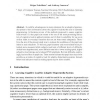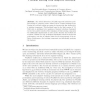AH
2004
Springer
14 years 9 months ago
2004
Springer
: This paper presents an evaluation study that compares two different problem selection strategies for an Intelligent Tutoring System (ITS). The first strategy uses static problem ...
AH
2004
Springer
14 years 9 months ago
2004
Springer
Web-based parameterized quizzes provide teachers and students with several advantages as the technology for self-assessment. However, the effect of these advantages is strongly red...
AH
2004
Springer
14 years 9 months ago
2004
Springer
AH
2004
Springer
14 years 9 months ago
2004
Springer
Conversational recommender systems help to guide users through a product-space towards a particular product that meets their specific requirements. During the course of a “conve...
AH
2004
Springer
14 years 9 months ago
2004
Springer
Adpating to user context versus adapting to individual user features or behaviour patterns has been a topic of recent discussion. We believe both types of adaptation are valuable a...
AH
2004
Springer
14 years 9 months ago
2004
Springer
This paper describes the context-aware mobile tourist application COMPASS that adapts its services to the user’s needs based on both the user’s interests and his current contex...
AH
2004
Springer
14 years 9 months ago
2004
Springer
Abstract. It could be advantageous in many situations for an adaptive hypermedia system to have information about the cognitive load that the user is currently experiencing. A lite...
AH
2004
Springer
14 years 9 months ago
2004
Springer
Abstract. The virtual laboratory (VILAB) supports interactive problem solving in computer science with access to complex software-tools. During the problem solving processes the le...
AH
2004
Springer
14 years 9 months ago
2004
Springer
EDUCE is an Intelligent Tutoring System for which a set of learning resources has been developed using the principles of Multiple Intelligences. It can dynamically identify learnin...
AH
2004
Springer
14 years 9 months ago
2004
Springer
Abstract. Adaptive navigation support normally attempts to make selecting a relevant hyperlink as easy as possible. However, in educational applications, this may have negative lea...


